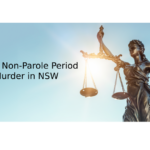NSW Government Increases Standard Non-Parole Period for Domestic Violence Murders

The New South Wales government has introduced the Crimes Legislation Amendment (Domestic and Sexual Offences) Bill 2025 into parliament which would, if passed, increase the standard non-parole period (SNPP) for offences of murder committed against current or former intimate partners from 20 to 25 years.
The move has been widely reported by the mainstream media as an increase in the minimum prison sentence that applies to such offences, with one media outlet reporting ‘Cop that cowards: DV killers to face 25-year minimum jail time’ and another reporting ‘Minimum 25-year jail terms for DV murderers’.
However, such reporting is grossly misleading as the legislation would merely increase the SNPP that applies to such offences, bringing it in line with offences of murdering a police officer or a person under the age of 18 years.
In fact, no minimum prison term applies to any offence of murder in New South Wales and this will continue to be the case if the new law is passed.
So, what is a standard non-parole period?
An SNPP is merely a guidepost or reference point for a sentencing judge when deciding how long a person must spend behind bars (called the ‘non-parole period’) before being eligible to apply for release from prison to serve the remainder of their sentence in the community on parole.
Section 54A of the Crimes (Sentencing Procedure) Act 1999 (NSW) explains that ‘the standard non-parole period represents the non-parole period for an offence… taking into account only the objective factors affecting the relative seriousness of that offence, is in the middle of the range of seriousness.’
And section 54B makes clear that any applicable SNPP is ‘a matter to be taken into account by a court in determining the appropriate sentence for an offender without limiting the matters that are otherwise required or permitted to be taken into account’.
So, while the SNPP is indeed a factor that is considered when determining the penalty that applies to an offence, it is only one of many considerations and is certainly not a ‘minimum jail term’ as reported by several mainstream media outlets.
In fact, several objective factors (those relating to the crime itself) and subjective factors (those relating to the defendant) may be taken into account when the non-parole period for an offence is set.
SNPPs do not apply to all criminal offences in New South Wales; not even to all serious offences.
Rather, Table to Division 1A of the Act lists all of the offences that attract SNPPs as well as the corresponding non-parole periods that apply. The table is posted at the end of this article.
The impetus
The tragic murder of 21-year old Mackenzie Anderson by her partner Tyrone Thompson is an event that tore apart a family and indeed a community.
Thompson stabbed Mackenzie 78 times in a frenzied attack in March 2022 just 16 days after being released on parole for assaulting the Newcastle woman and despite being subject to an apprehended domestic violence order.
Thompson was ultimately sentenced to 22 years and six months in prison for the murder, which was widely criticised as ‘manifestly inadequate’.
The horrific murder and resulting sentence led Mackenzie’s mother, Tabitha Acret, on a campaign to put in place better protections and greater deterrence measures for women at risk of serious domestic violence offences.
That campaign has contributed to the increased SNPP for domestic murder being introduced into parliament.
The reasoning
The state government has issued a media release which describes the legislation as being ‘part of its ongoing work to build a safer New South Wales’.
According to Attorney-General Michael Daley:
“A 25-year standard non-parole period reflects the community’s deep sense of outrage and the lasting harm these crimes cause.
“It is also about consistency and transparency, ensuring courts have a clear benchmark that reflects the severity of intimate partner homicide.”
The Minister for the Prevention of Domestic Violence and Sexual Violence, Jodie Harrison, states in the release:
“While today’s legislation is an important step, we know there is more to do. We will continue working with advocates, experts and victim-survivors to stop violence before it starts and support those impacted to rebuild their lives.”
Will it make any difference?
Despite the mainstream media hailing the change as an important step towards making women safer in our community, there is a strong argument that increasing the SNPP from 20 to 25 years will make very little, if any, difference in reality; in other words, it is unlikely to deter would-be offenders from committing domestic violence murders and will only make a negligible difference when it comes to setting non-parole periods.
Perhaps the development and implementation of better support services for vulnerable women (and men for that matter) and greater funding for those services, as well as educational initiatives are a superior pathway to effecting the cultural change needed to reduce the incidence of women being victimised by their current and former partners.
Current standard non-parole offences and periods in New South Wales
| Murder — of a police officer, emergency services worker, correctional officer, judicial officer, council law enforcement officer, health worker, teacher, community worker, or other public official, exercising public or community functions and the offence arose because of the victim’s occupation or voluntary work | 25 years |
| Murder — where the victim was a child under 18 years of age | 25 years |
| Murder — in other cases | 20 years |
| Section 26 Crimes Act 1900 (conspiracy to murder) |
10 years |
| Sections 27, 28, 29 or 30 Crimes Act 1900 (attempt to murder) |
10 years |
| Section 33 Crimes Act 1900 (wounding etc with intent to do bodily harm or resist arrest) |
7 years |
| Section 33A(1) Crimes Act 1900 (discharging a firearm with intent to cause grievous bodily harm) |
9 years |
| Section 33A(2) Crimes Act 1900 (discharging a firearm with intent to resist arrest or detention) |
9 years |
| Section 35(1) Crimes Act 1900 (reckless causing of grievous bodily harm in company) |
5 years |
| Section 35(2) Crimes Act 1900 (reckless causing of grievous bodily harm) |
4 years |
| Section 35(3) Crimes Act 1900 (reckless wounding in company) |
4 years |
| Section 35(4) Crimes Act 1900 (reckless wounding) |
3 years |
| Section 60(2) Crimes Act 1900 (assault of police officer occasioning bodily harm) |
3 years |
| Section 60(3) Crimes Act 1900 (wounding or inflicting grievous bodily harm on police officer) |
5 years |
| Section 61I Crimes Act 1900 (sexual assault) |
7 years |
| Section 61J Crimes Act 1900 (aggravated sexual assault) |
10 years |
| Section 61JA Crimes Act 1900 (aggravated sexual assault in company) |
15 years |
| Section 61KD(1) Crimes Act 1900 (aggravated sexual touching) |
5 years |
| Section 61M(1) Crimes Act 1900 (aggravated indecent assault) |
5 years |
| Section 61M(2) Crimes Act 1900 (aggravated indecent assault) |
8 years |
| Section 66A Crimes Act 1900 (sexual intercourse with a child under 10) |
15 years |
| Section 66B Crimes Act 1900 (attempt, or assault with intent, to have sexual intercourse with a child under 10 years) |
10 years |
| Section 66C(1) Crimes Act 1900 (sexual intercourse with a child 10–14 years) |
7 years |
| Section 66C(2) Crimes Act 1900 (aggravated sexual intercourse with a child 10–14 years) |
9 years |
| Section 66C(4) Crimes Act 1900 (aggravated sexual intercourse with a child 14–16 years) |
5 years |
| Section 66DA Crimes Act 1900 (aggravated sexual touching of a child under 10 years) |
8 years |
| Section 66EB(2) Crimes Act 1900 (procure a child under 14 years for unlawful sexual activity) |
6 years |
| Section 66EB(2) Crimes Act 1900 (procure a child 14–16 years for unlawful sexual activity) |
5 years |
| Section 66EB(2A) Crimes Act 1900 (meet a child under 14 years following grooming) |
6 years |
| Section 66EB(2A) Crimes Act 1900 (meet a child 14–16 years following grooming) |
5 years |
| Section 66EB(3) Crimes Act 1900 (groom a child under 14 years for unlawful sexual activity) |
5 years |
| Section 66EB(3) Crimes Act 1900 (groom a child 14–16 years for unlawful sexual activity) |
4 years |
| Section 91D(1) Crimes Act 1900 (induce a child under 14 years to participate in child prostitution) |
6 years |
| Section 91E(1) Crimes Act 1900 (obtain benefit from child prostitution, child under 14 years) |
6 years |
| Section 91G(1) Crimes Act 1900 (use a child under 14 years for child abuse material purposes) |
6 years |
| Section 93GA(1) Crimes Act 1900 (fire a firearm at a dwelling-house or other building with reckless disregard for the safety of any person) |
5 years |
| Section 93GA(1A) Crimes Act 1900 (fire a firearm, during a public disorder, at a dwelling-house or other building with reckless disregard for the safety of any person) |
6 years |
| Section 93GA(1B) Crimes Act 1900 (fire a firearm, in the course of an organised criminal activity, at a dwelling-house or other building with reckless disregard for the safety of any person) |
6 years |
| Section 98 Crimes Act 1900 (robbery with arms etc and wounding) |
7 years |
| Section 112(2) Crimes Act 1900 (breaking etc into any house etc and committing serious indictable offence in circumstances of aggravation) |
5 years |
| Section 112(3) Crimes Act 1900 (breaking etc into any house etc and committing serious indictable offence in circumstances of special aggravation) |
7 years |
| Section 154C(1) Crimes Act 1900 (taking motor vehicle or vessel with assault or with occupant on board) |
3 years |
| Section 154C(2) Crimes Act 1900 (taking motor vehicle or vessel with assault or with occupant on board in circumstances of aggravation) |
5 years |
| Section 154G Crimes Act 1900 (organised car or boat rebirthing activities) |
4 years |
| Section 203E Crimes Act 1900 (bushfires) |
5 years |
| Section 23(2) Drug Misuse and Trafficking Act 1985 (cultivation, supply or possession of prohibited plants), being an offence that involves not less than the large commercial quantity (if any) specified for the prohibited plant concerned under that Act) |
10 years |
| Section 24(2) Drug Misuse and Trafficking Act 1985 (manufacture or production of commercial quantity of prohibited drug), being an offence that:(a) does not relate to cannabis leaf, and(b) if a large commercial quantity is specified for the prohibited drug concerned under that Act, involves less than the large commercial quantity of that prohibited drug) |
10 years |
| Section 24(2) Drug Misuse and Trafficking Act 1985 (manufacture or production of commercial quantity of prohibited drug), being an offence that:(a) does not relate to cannabis leaf, and(b) if a large commercial quantity is specified for the prohibited drug concerned under that Act, involves not less than the large commercial quantity of that prohibited drug) |
15 years |
| Section 25(2) Drug Misuse and Trafficking Act 1985 (supplying commercial quantity of prohibited drug), being an offence that:(a) does not relate to cannabis leaf, and(b) if a large commercial quantity is specified for the prohibited drug concerned under that Act, involves less than the large commercial quantity of that prohibited drug) |
10 years |
| Section 25(2) Drug Misuse and Trafficking Act 1985 (supplying commercial quantity of prohibited drug), being an offence that:(a) does not relate to cannabis leaf, and(b) if a large commercial quantity is specified for the prohibited drug concerned under that Act, involves not less than the large commercial quantity of that prohibited drug) |
15 years |
| Section 7 Firearms Act 1996 (unauthorised possession or use of firearms) |
4 years |
| Section 51(1A) or (2A) Firearms Act 1996 (unauthorised sale of prohibited firearm or pistol) |
10 years |
| Section 51B Firearms Act 1996 (unauthorised sale of firearms on an ongoing basis) |
10 years |
| Section 51D(2) Firearms Act 1996 (unauthorised possession of more than 3 firearms any one of which is a prohibited firearm or pistol) |
10 years |
| Section 7 Weapons Prohibition Act 1998 (unauthorised possession or use of prohibited weapon) — where the offence is prosecuted on indictment) |
5 years |






